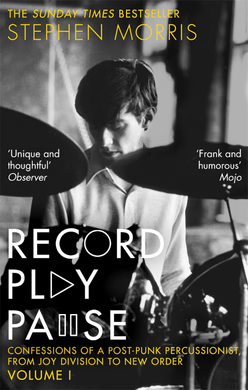Record Play Pause

Warm, witty, self-deprecating and self-aware, drummer Stephen Morris’s first volume of memoirs chronicles his formative years in the Manchester suburb of Macclesfield through joining Joy Division, its end, and the early days of New Order.
Morris proves an outstanding raconteur. Close enough to proffer a first-person account, but devoid of the ego typical in rock memoirs. He establishes his self-deprecating tone early, enlivening the otherwise dry story of his childhood, with a commentary on his early introduction to music via the clarinet.
I think my dad liked the idea of this music tuition more than me. He was a firm believer that knowing how to play an instrument was a benefit. The next thing I knew I was signed up for clarinet lessons. I felt a little bit railroaded. Given the choice, I would’ve had another go at the guitar, but that class was heavily oversubscribed. Everyone always wants to be the next Hendrix or Clapton, and so did I. You could look cool strumming a guitar. The clarinet is a lovely-sounding instrument but it would not make me look cool. It would make me look like a dick.
Late-seventies Britain birthed many bands, and Morris’s story helps explain why. A generation born into the rubble of World War II comes of age seeing with a national angst. The middle class flight to the new suburbs leaves them without the distractions of a big city, but the country’s small size means every small town’s lone live-music hall is within driving distance. The combination led to many teens forming bands, spending countless hours practicing and gigging, learning their way into their trade. English boredom births a cultural phenomenon.
And so, after an adolescence notable for a penchant for drugs, alcohol and insubordination, Morris stumbles into Joy Division (then known as Warsaw) by answering a handwritten ad from lead singer Ian Curtis in a Macclesfield music shop’s window.
Despite the hours the Warsaw bandmates spend together, Morris remains on the fringe. Consider how he learns of guitarist Bernard Sumner’s wedding. It’s Morris’s twenty-first birthday, and he asks Ian if he’d fancy going out for drinks.
‘Oh no, I’m still worn out. I had to be Barney’s bestman. What a palaver. I’m knackered.’
Was I hearing things, ‘“best man”?’
‘Yes, him and Sue have got married.’
Morris proves self-aware enough to recognize his place in the group. Bassist Peter “Hooky” Hook was adversarial, impulsive, and aggressive. Sumner, more reserved and analytical, Ian, torn between the two extremes. And Morris? He had a car.
It was the fact that we were all different that made the band what it was. I was a wimp. But a wimp with wheels.
And lest you worry Morris might view the now near-mythic Joy Division years through nostalgia-tinted glasses, he includes a deadpan anecdote where, one boring Sunday afternoon, the band members shut a helmeted and gloved Ian into one of their new foam-lined flight cases, then pushed him down the steep stairs at speed.
It was a Poundland version of Evel Knievel jumping the Grand Canyon. These were the lengths we would have to go to to get inspiration for some of our most sombre and profound works.
As this first volume nears its close, Joy Division begins its ascent. Gigging increases.
Like much in life, there is a hierarchy that exists in bands. It may not have been there at the inception, but believe me it will develop like algae on a pond. As a rule of thumb, I have found this usually equates to the individual band member in question’s proximity to the audience.
After Ian’s suicide, the band struggles to find their way forward, lacking both a lyricist and a vocalist. They record two songs of Ian’s, one of which (“In a Lonely Place”) begins New Order’s penchant for naming songs after movies.
I always wondered about this, and Morris confides the title came from a poster they swiped from a gig in Berlin that served as wallpaper in their rehearsal room. Said poster also list forthcoming attractions that would become the source of future song titles, such as “Cries and Whispers”.
The audiobook, read by Morris, proves superior to the written work, as it affords Morris the timing and inflection absent on the page. He’s an engaging, enthusiastic storyteller, conveying a sense of wonderment at the ride that’s been his life.
Reading History
- 2023Nov11SatAudiobook (Read by Stephen Morris)
Read over 6 Days
- 6 Nov 202343%
- 8 Nov 202349%
- 10 Nov 202377%
- 11 Nov 2023Finished